Unit 4 Body Language
单元讲解必修四unit4 body language

单元讲解必修四unit4 bodylanguage课本单元讲解(含课文音频):必修四Unit4 Body language_doctor今天,要和大家分享的是人教版必修四Unit4常考单词、高频短语和写作句式,并附有课文音频学起来哦!Unit4 Body language常考单词、高频短语和写作句式Ⅰ. 常考单词必背1.statementn. 陈述;说明His statement is pletely untrue.他的话完全是在撒谎。
2.greetvi.&vt. 迎接;问候I greeted her with a smile.我笑着向她致意。
(1)greet sb with... 用……迎接……;用……向某人打招呼(2)greeting n. (常用复数形式) 问候;祝贺;贺词3.representvt. 代表;象征In the western countries,V often represents victory.在西方国家,V常象征着胜利。
He represented himself as a doctor.他自称是一个医生。
[快速闪记](1)represent sth to sb 向某人说明某事,向某人传达某事represent...as... 把……描绘成……represent oneself as/to be... 自称是……(2)representative n. 代表4.curiousadj. 好奇的The children were curious to know what was happening over there.孩子们很想知道那边发生了什么事。
[快速闪记](1)be curious about 对(某事物)感到好奇be curious to do... 很想做某事;渴望做某事(2)curiously adv. 好奇地5.approachvt..&vi.接近;靠近;走近 n. 接近;方法;途径As summer approached,the weather became hotter and hotter.随着夏天的临近,天气越来越热。
高考英语一轮第一部分教材知识梳理Unit4BodyLanguage新人教版选择性必修第一册
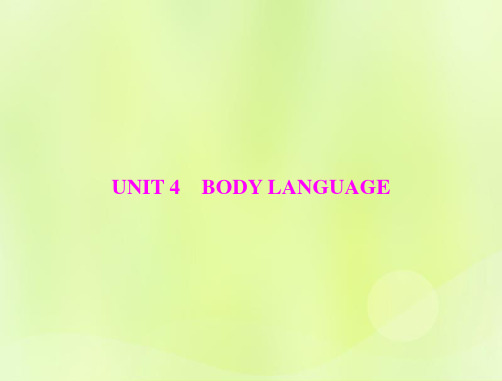
13.perceive vt.察觉;看待;理解 14.chest n.胸部;胸膛
15.weep vi.& vt.哭泣;流泪 16.inquire vi.& vt.询问;打听 17.ultimately adv.最终;最后 ponent n.组成部分;零件
高频词汇
1._d_e_m__o_n_s_tr_a_te_ vt.表现;表达;说明;证明 2._w__it_n_e_s_s_ vt.当场看到;目击;见证 n.目击者;证人 3._i_n_c_id_e_n_t_ n.发生的事情;严重事件;冲突 4.__r_e_v_e_al__ vt.揭示;显示;露出 5.__l_o_w_e_r__ vt.把……放低;降低;减少 adj.下面的;下方 的;较小的 6.__i_m_p_l_y__ vt.意味着;暗示 7.__o_c_c_u_p_y_ vt.占据;占用
7.fake adj.假装的;假的;冒充的 8.trial n.& v.审讯;审判;试验;试用 9.twin adj.双胞胎之一的;孪生之一的 n.孪生之一;双胞 胎之一 10.internal adj.内部的;里面的 11.pose n.故作姿态;(为画像、拍照等摆的)姿势 vi.摆好 姿势 vt.造成(威胁;问题等) 12.bend vt.& vi.(使)弯曲;倾斜;偏向
课文复现 Just like 1.__s_p_o_k_en__ (speak) language, body language 2.__v_a_r_ie_s__ (vary) from culture to culture.For example, making eye contact in some countries is a way 3.___to__d_is_p_l_a_y__ (display) interest while men and women are not 4.___so_c_i_a_ll_y__ (social) permitted to make eye contact in many Middle Eastern countries. In many countries, shaking one's head means “no” and 5.__n_o_d_d_in_g__ (nod) one's head means “yes”.By 6.__c_o_m_p_a_r_is_o_n__ (compare), the gestures have the opposite meaning in Bulgaria and 7.___so_u_t_h_e_rn__ (south) Albania.
高中英语必修四Unit4 Body language要点解析

这公 园倒是 个适 合野 餐 的地 方 。
I s o lk l t a t S ma i r ts t n t i ey h t he o l i pia e
0 i ya a. 必 须 悄 悄 地 走 近 那 只 riw l f w y 你 t ll 鸟 . 则它会 飞走 的 。 否
te a po c fwne 随 着 冬 季 的 来 临 h p rah o itr mae a poc e os . 想 亲 近 某 人 a — k p rah st b p poc b a ot t. 为某 事 同某 人 打交 道 rah s. bu h s
ter igo ev gt l r e h i n f h eea epi .大 雪 的一 个 s t b c
J h s l ey t e i o d n t i a — o n i i l o b n L n o h s u k
cme od r 冬季来 临 时 , o s le. c 天气 更冷 了 。
We h a d t e a p o c fte t i.我 e r h p ra h o h r n a
Ou l s ma e n e o r p e e tt e rc a s t s wa th rt e r s n h
c s i tesh o cnet 我 们 班 的 同学 想 l S n h co l o ts a . 让 她代 表班级 参加学 校 的竞赛 。
Th sp i tn e r s n sa h n i g s e e i a n i g r p e e t u tn c n .
可能 的结果 就是 菜价 上涨 。
【 知识 拓展 】
l ey常 用 于 以下 两 种 结 构 中 :1s i l k 1 b/
Unit 4 Body Language 词汇知识点课件 高二英语(人教2019版选择性必修第一册)
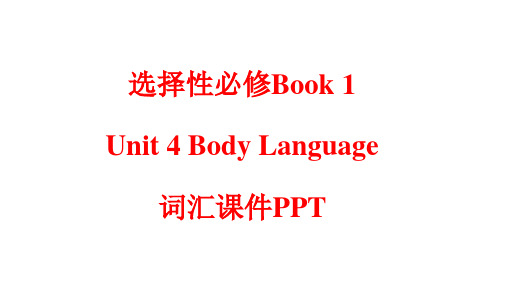
.call on
• ①拜访(某人) • ②号召;要求
•n
• [C]目击者;见证人;证人
• be (a) witness to ...是...的目击者;是...的见证人
• vt
• 目击;亲眼所见
.employ
• vt
• ①雇用;聘请
• employ sb to do sth雇佣/聘请某人做某事
• ②[正式用语]使用;利用
• be employed in doing sth忙于做某事
• 内部的;体内的;内心的
.straighten up
• 起来;整理;收拾整齐
• 【拓展】
• straight
• adj①(笔)直的; 平直的②整齐的;端正的③正直的;诚实的④纯粹的
• get sth straight [口语]弄清楚某事
• adv①笔直地;成直线地②直接;立即③连续地
• straight away / off立即;马上
.distract
• vt
• 分散(注意力);使分心
• 【同根词】
• distracted adj.注意力分散的;思想不集中的
.perceive
• vt
• [正式用语]察觉;发觉;看待;理解
.distinguish
•v
• ①vi&vt区别;辨认;使有别于 • ②vt使杰出;使显出特色
• 【同根词】
• 【同根词】
• bare adj ①赤裸的;光秃秃的;空的 ②仅有的;最基本的
.chin
• n.
• 下巴,下颌
.occupy
• vt
• ①占领;占据 • ②占用/占去(时间、空间) (take up) • ③使忙碌
人教必修四Unit4-Body-language-词汇要点讲解
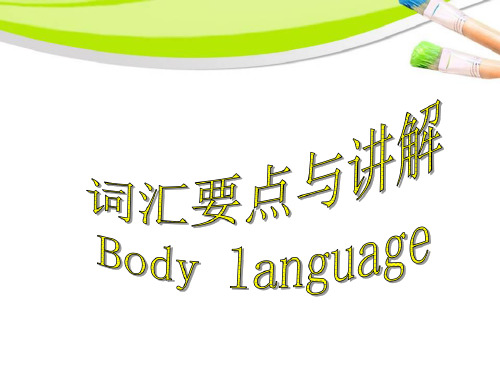
(3)面对困难时,他们从不放弃而是努力寻找出路。
F_a_c_e_d_w_i_th_d_i_ff_ic_u_l_ti_es___,_they never give up but try their best to find a way out.
司机看错了一个重要的信号。
• I'm afraid you completely misread the situation. 恐怕你完全看错了形势。
• 3 facial 脸部的,面部的 • facial expression 面部表情 • facial tissues 面巾纸 • facial painting 脸谱 • facial cream 美容霜
ease. 他递给她一杯咖啡,让她放松下来。
with ease=easily轻易地
At ease ! 稍息!
10.lose face 丢脸;失面子 lose face with sb在…面前丢脸
lose heart 泄气,灰心 ; lose one’s heart to…爱上…
(1)save one's face
• 5 function n.作用,功能,职能 v.起作用
• The function of the government is to serve the people.
• 政府的职能是为人民服务。 • The sofa can also function as a bed.
这沙发也可以当床。
• Some English nouns function as verbs.
她从椅子上跳起来迎接她父亲。 greet sb with (a smile)用…向…问候 greeting(s) n.
必修四-unit4-body-language-知识点汇编
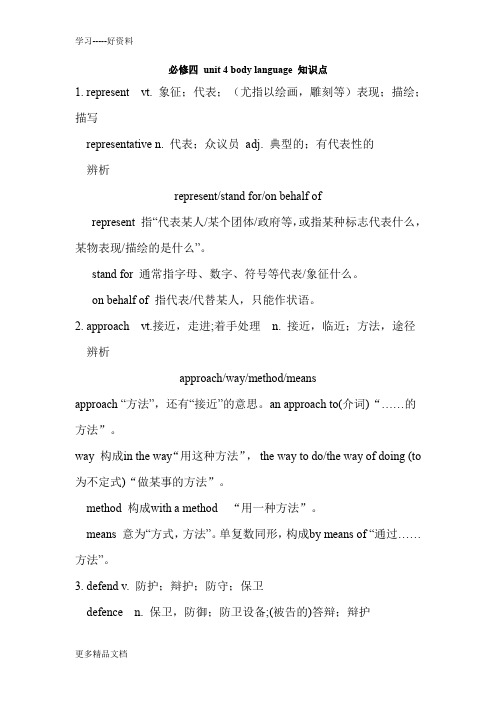
必修四unit 4 body language 知识点1. represent vt.象征;代表;(尤指以绘画,雕刻等)表现;描绘;描写representative n.代表;众议员adj.典型的;有代表性的辨析represent/stand for/on behalf ofrepresent 指“代表某人/某个团体/政府等,或指某种标志代表什么,某物表现/描绘的是什么”。
stand for 通常指字母、数字、符号等代表/象征什么。
on behalf of 指代表/代替某人,只能作状语。
2. approach vt.接近,走进;着手处理n.接近,临近;方法,途径辨析approach/way/method/meansapproach “方法”,还有“接近”的意思。
an approach to(介词)“……的方法”。
way 构成in the way“用这种方法”,the way to do/the way of doing (to 为不定式)“做某事的方法”。
method 构成with a method “用一种方法”。
means 意为“方式,方法”。
单复数同形,构成by means of “通过……方法”。
3. defend v.防护;辩护;防守;保卫defence n.保卫,防御;防卫设备;(被告的)答辩;辩护常用结构:defend oneself 自卫,辩护defend oneself from/against 保护自己免受……in defence of 保卫……;为……辩护注意:defence后接“入侵者”或“造成危害者”时用介词against;若后接“被保护者”时用介词of。
4. major adj. 主要的;vi. 主修majority n.大多数minority n.少数,少数民族5. misunderstand-misundstood-misunderstood vt. 误解,误会misunderstanding adj.n. 误解,误会6. adult n. 成年人adj.成人的,成熟的7. simple adj. 简单的simply adv. 简单的,只是8.function n. 功能;职能;作用(vi.)起作用;运转functional adj. 功能的9.spoken adj. 口语的unspoken adj. 未说出口的;非口语的10. face n. 脸facial adj. 面部的11. true adj. 真实的,真诚的;真正的truly adv.真实地,真诚地;真正地12. hug vi. & vt. 拥抱give sb. a hug 拥抱某人13. curious adj.好奇的,感兴趣的;奇异的,不同寻常的curiosity n.好奇curiously adv.好奇地be curious about 对……感到好奇be curious to do 急于做/极想做out of curiosity 出于好奇14. likely adj.可能的(表示可能性很大时,可用most,very修饰likely)It is likely that sb. ...=sb. is likely to do...某人可能做某事not likely (表示坚决不同意)绝不可能;绝对不会15. ease n.安逸;舒适v.减轻(痛苦,忧虑);缓和;放松at ease 感到舒适而无忧虑;感到放松,不拘束with ease 毫不费劲地,轻而易举地16. lose face 丢脸lose heart 泄气;灰心lose one’s heart to 爱上;钟情于lose weight 减肥lose one’s way 迷路lose one’s life 丧生lose courage 丧失勇气lose sight of 看不见17. turn one’s back to 背对,背弃18. subjective adj. 主观的;objective adj. 客观的19. on the contrary 相反20. in general 总的来说,通常generally speaking 总体而言;一般而言on the whole 总的来说in a word 总之in short 简言之21. put up 举起;升起;搭建;留宿22. be wrong about 误解。
模块4Unit 4 Body language短语总结
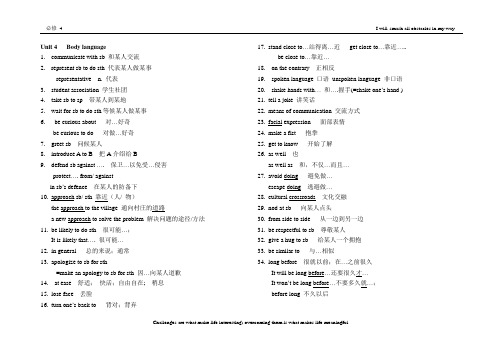
Unit 4 Body languagemunicate with sb 和某人交流2.represent sb to do sth 代表某人做某事representative n. 代表3.student association 学生社团4.take sb to sp 带某人到某地5.wait for sb to do sth等候某人做某事6.be curious about 对…好奇be curious to do 对做…好奇7.greet sb 问候某人8.introduce A to B 把A介绍给B9.defend sb against …. 保卫…以免受…侵害protect…. from/ againstin sb’s defence 在某人的防备下10.approach sb/ sth 靠近(人/ 物)the approach to the village 通向村庄的道路a new approach to solve the problem 解决问题的途径/方法11.be likely to do sth 很可能…;It is likely that…. 很可能…12.in general 总的来说;通常13.apologize to sb for sth=make an apology to sb for sth 因…向某人道歉14.at ease 舒适;快活;自由自在; 稍息15.lose face 丢脸16.turn one’s back to 背对;背弃17.stand close to…站得离…近get close to…靠近…..be close to…靠近…18.on the contrary 正相反19.spoken language 口语unspoken language 非口语20.shake hands with…和….握手(=shake one’s hand )21.tell a joke 讲笑话22.means of communication 交流方式23.facial expression 面部表情24.make a fist 抱拳25.get to know 开始了解26.as well 也as well as 和,不仅…而且…27.avoid doing 避免做…escape doing 逃避做…28.cultural crossroads 文化交融29.nod at sb 向某人点头30.from side to side 从一边到另一边31.be respectful to sb 尊敬某人32.give a hug to sb 给某人一个拥抱33.be similar to 与…相似34.long before 很就以前;在…之前很久It will be long before…还要很久才…It won’t be long before…不要多久就…;before long 不久以后Challenges are what make life interesting; overcoming them is what makes life meaningful.句型:35.She stepped back appearing surprised and put up her hands, as if indefence.36.The first person to arrive was Tony, closely followed by Julia37.Not all cultures greet each other the same way, nor are they comfortable inthe same way with touching or distance between people.38.With so many cultural differences between people, it is great to havesome similarities in body language.Challenges are what make life interesting; overcoming them is what makes life meaningful.。
(人教版)选择性必修第一册:UNIT 4 BODY LANGUAGE(含解析)
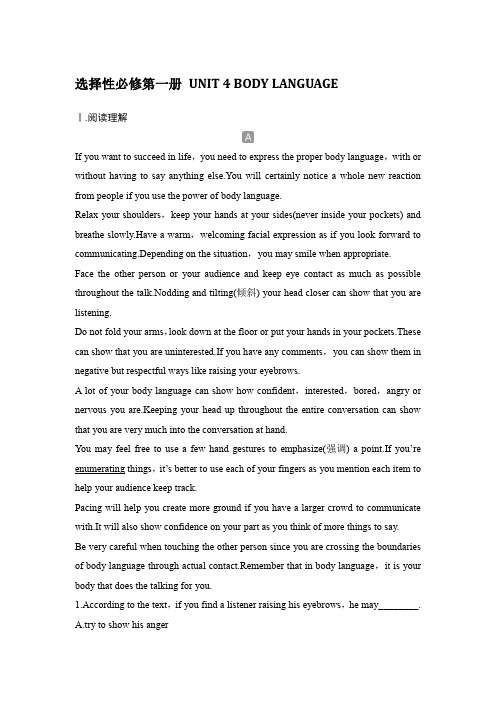
选择性必修第一册UNIT 4 BODY LANGUAGEⅠ.阅读理解If you want to succeed in life,you need to express the proper body language,with or without having to say anything else.You will certainly notice a whole new reaction from people if you use the power of body language.Relax your shoulders,keep your hands at your sides(never inside your pockets) and breathe slowly.Have a warm,welcoming facial expression as if you look forward to communicating.Depending on the situation,you may smile when appropriate.Face the other person or your audience and keep eye contact as much as possible throughout the talk.Nodding and tilting(倾斜) your head closer can show that you are listening.Do not fold your arms,look down at the floor or put your hands in your pockets.These can show that you are uninterested.If you have any comments,you can show them in negative but respectful ways like raising your eyebrows.A lot of your body language can show how confident,interested,bored,angry or nervous you are.Keeping your head up throughout the entire conversation can show that you are very much into the conversation at hand.You may feel free to use a few hand gestures to emphasize(强调) a point.If you’re enumerating things,it’s better to use each of your fingers as you mention each item to help your audience keep track.Pacing will help you create more ground if you have a larger crowd to communicate with.It will also show confidence on your part as you think of more things to say.Be very careful when touching the other person since you are crossing the boundaries of body language through actual contact.Remember that in body language,it is your body that does the talking for you.1.According to the text,if you find a listener raising his eyebrows,he may________.A.try to show his angerB.want to give his own opinionC.not understand what you sayD.want to prove his confidence2.The underlined word “enumerating” in paragraph 6 may mean “________”.A.consideringB.judgingC.numberingD.discussing3.What’s the author’s suggestion if you have a larger crowd to communicate with?A.To walk at a slow pace.B.To shake hands with every person.C.To look down at the floor.D.To fold your arms.4.What is the most suitable title for the text?A.The Power of Body LanguageB.The Attraction of Body LanguageC.The Origin of Body LanguageD.The Understanding of Body LanguageA simple gesture can be formed into a child’s memory so quickly that it will cause the child to give a false answer to a question accompanied by that gesture.A new finding suggests that parents,social workers,psychologists and lawyers should be careful with their hands as well as their words.Gestures can be as informative as speech,but hand gestures are so common that we rarely notice we’re using them.While the recall of both adults and children are easy to react to suggestion,the memories of children are known to be particularly influenced,said lead researcher Sara Broaders of Northwestern University.Kids are used to looking to adults to tell events for them and can be misled even if not intentionally(有意地).Previous research,for example,has shown that detail-loaded questions often cause false answers; when asked,say “Did you drink juice at the picnic?” the child is likely to say “yes” even if no juice had been available.It is not that the child isconsciously lying,but rather the detail is quickly formed into his or her memory.To avoid this problem,social workers have long been advised to ask children only open-ended questions,such as“What did you have at the picnic?”But an open-ended question paired with a gesture,briefly meaning a juice box,is treated like a detailed question.That is,children become likely to answer falsely.And it isn’t just a few kids: 77% of children gave at least one piece of false information when a detail was suggested by an ordinary gesture.Gestures may also become more popular when talking with non-fluent language users,such as little kids,Broaders said as hand movements can impart meaning of unfamiliar words and phrases.“It certainly seems reasonable that adults would gesture more with children.”In general,Broaders advises parents and other adults to“Try to be aware of your hands when questioning a child about an event.Otherwise,you might be getting answers that don’t reflect what actually happened.”5.What do we know about gestures according to the text?A.They have a certain effect on children.B.They are rarely used by people.C.They have no function at all.D.They are often used by social workers.6.Why are kids easy to be misled by gestures according to Sara Broaders?A.These gestures are very attractive.B.Their memories are affected easily.C.Children are easy to tell lies.D.These gestures are used frequently.7.What does the underlined word “impart” in paragraph 6 mean?A.Separate.B.Tell apart.C.Confuse.D.Pass on.8.Which of the following can be the best title for the text?A.Gestures—A Useful Way of EducationB.Gestures Can Mislead ChildrenC.Gestures Mean Adult’s DirectionsD.Gestures Affect Children LittleⅡ.完形填空Do you listen?Do you really listen?Is there more to listening than just hearing? Listening is,by far,one of the most important aspects of communication.So often,you pay attention to your way of speaking,your __1__,your dialect,but neglect your ability to listen.It is my __2__ that people scream out or change the intended purposes of much of what they hear.Too often,we consider listening the __3__ part of conversation,although it requires our focus,purpose,and active participation.Listening means to give ear to,to pay attention to,to __4__,to witness,to hear with thoughtful __5__,or to understand.The most basic of all human needs is the need to understand and to be understood.The only way to understand is to __6__.Learn to be an active listener.Give off positive body language.__7__ a willingness to socialize.Ask the right questions.Boost your __8__ so that you can understand more and achieve effective listening.Listening means we should respond,that we should be touched,that what we hear has a(n)__9__ on us.I believe that history __10__ itself only because no one listens the first time.You were given two ears,but only one mouth,which is a gentle hint that we should listen more,because God knew that listening was twice as __11__ as talking.Listening is the key building block in effective communications.Good listening skills are crucial,as listening is the fundamental __12__ of all information. Isn’t now the time to give the gift of listening to those about you?Give them your __13__ e your God given __14__ to become a better listener.For me,I’m going to put into __15__ what I believe in my heart and become a better listener.1.A.sounds B.wordsC.gesturesD.movements2.A.conception B.planC.purposeD.requirement3.A.active B.passiveC.basiceless4.A.argue B.quarrelC.discussD.obey5.A.advice B.attentionC.loveD.help6.A.ask B.learnC.tryD.listen7.A.Send B.PresentC.PredictD.Design8.A.courage B.confidenceC.energyD.knowledge9.A.impact B.connectionC.emotionD.difference10.A.makes B.failsC.repeatsD.destroys11.A.interesting B.hardC.muchD.long12.A.resource B.materialC.sourceD.element13.A.considerate B.wideC.extraD.entirermation B.talentsC.messagesD.ideas15.A.effect B.positionC.practiceD.serviceⅢ.语法填空(2024·辽宁省教研联盟高三一模)Elderly people like to use technology to entertain themselves and keep in touch withfriends.They don’t want to rely on anyone.Instead,they just hope to remain 1.____________ (dependent).Plenty of time 2.____________ (spend) in finding out new things or writing down their experiences every day.Many social media sites 3.____________ (develop) for the younger generation are now being enjoyed by the elderly,too.“Our granddaughter helped me set up 4.____________ social media profile,” one explained.“I soon found lots of people to chat 5.____________ and some invited me to join their online puzzle groups.6.____________ keeps my brain active to communicate with people online.” And for elderly people who may be unable to leave their homes without 7.____________ (assist),communication with the outside world is essential,to prevent loneliness and to allow them to call for help in many 8.____________ (emergency).In Singapore,the elderly are even turning to robots to keep them in shape 9.____________ (physical).These robots not only lead daily workouts,10.____________ can provide senior citizens with feedback on their performance,as well as sending photos via social media.选择性必修第一册UNIT 4Ⅰ.【语篇解读】本文是说明文。
高中英语选择性必修一unit4 body language知识点
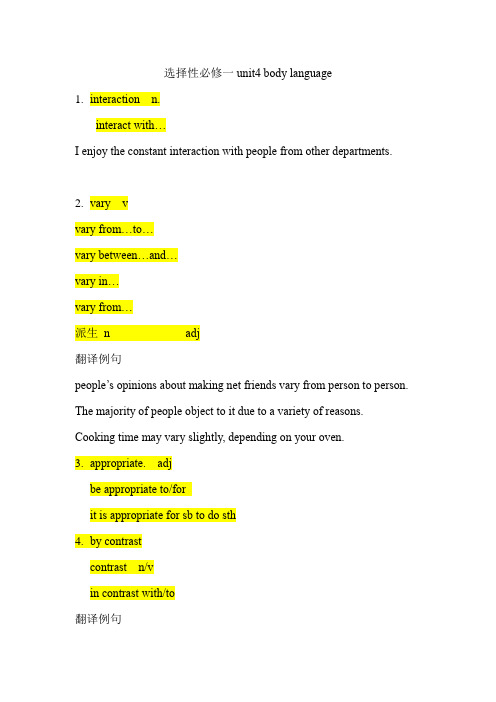
选择性必修一unit4 body language1.interaction n.interact with…I enjoy the constant interaction with people from other departments.2.vary vvary from…to…vary between…and…vary in…vary from…派生n adj翻译例句people’s opinions about making net friends vary from person to person. The majority of people object to it due to a variety of reasons. Cooking time may vary slightly, depending on your oven.3.appropriate. adjbe appropriate to/forit is appropriate for sb to do sth4.by contrastcontrast n/vin contrast with/to翻译例句Most people work because it is unavoidable. By contrast, there are some people who actually enjoy work.The house appears big that one. 与那个房子对比,这个房子显得很大。
(名词短语或动词现在分词做状语)相比之下,Mary 比Tom勤奋得多。
(diligent)在书中,作者对比了善与恶。
5.differ . v.differ from…= be different from…differ in…= be different in…differ with sb on sth…拓展:tell the differencemake a difference to…make no difference翻译例句People differ from one another their ability to handle stress.A small step makes big difference.Can you the difference between the words “require”and”request”?6.by comparisoncompare v.compare ..with…compare…to…莎士比亚shakespear 把世界比作舞台。
unit 4 body language 课文讲解
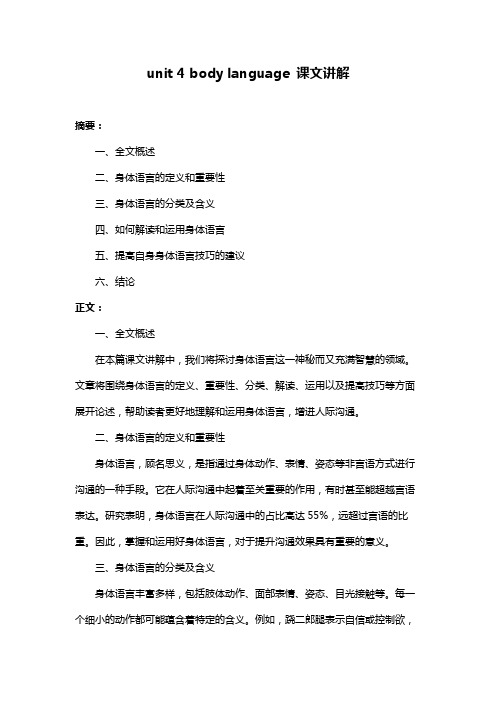
unit 4 body language 课文讲解摘要:一、全文概述二、身体语言的定义和重要性三、身体语言的分类及含义四、如何解读和运用身体语言五、提高自身身体语言技巧的建议六、结论正文:一、全文概述在本篇课文讲解中,我们将探讨身体语言这一神秘而又充满智慧的领域。
文章将围绕身体语言的定义、重要性、分类、解读、运用以及提高技巧等方面展开论述,帮助读者更好地理解和运用身体语言,增进人际沟通。
二、身体语言的定义和重要性身体语言,顾名思义,是指通过身体动作、表情、姿态等非言语方式进行沟通的一种手段。
它在人际沟通中起着至关重要的作用,有时甚至能超越言语表达。
研究表明,身体语言在人际沟通中的占比高达55%,远超过言语的比重。
因此,掌握和运用好身体语言,对于提升沟通效果具有重要的意义。
三、身体语言的分类及含义身体语言丰富多样,包括肢体动作、面部表情、姿态、目光接触等。
每一个细小的动作都可能蕴含着特定的含义。
例如,跷二郎腿表示自信或控制欲,双手交叉在胸前则表示抗拒或紧张。
通过学习和观察这些身体语言,我们可以更好地了解他人的心理状态和真实意图。
四、如何解读和运用身体语言解读身体语言需要具备一定的观察能力和同理心。
观察他人的身体语言,要注意其持续时间、幅度、频率等细节。
同时,结合语境和对方的特点,加以分析和判断。
在运用身体语言时,要遵循适度、自然、真诚的原则,让自己的身体语言更具感染力。
五、提高自身身体语言技巧的建议1.增强自信心:自信是身体语言的基石,自信的人往往更具吸引力。
2.注意肢体协调:协调的肢体动作能使身体语言更加自然流畅。
3.培养良好的面部表情:微笑、眼神交流等面部表情能让对方感受到你的诚意。
4.学会倾听:倾听他人的意见,展示出尊重和关注。
六、结论身体语言在人际沟通中占据着重要地位。
通过学习、观察和运用身体语言,我们可以更好地与他人沟通交流,建立和谐的人际关系。
人教 必修4 Unit4 Body language 词汇语言点讲解
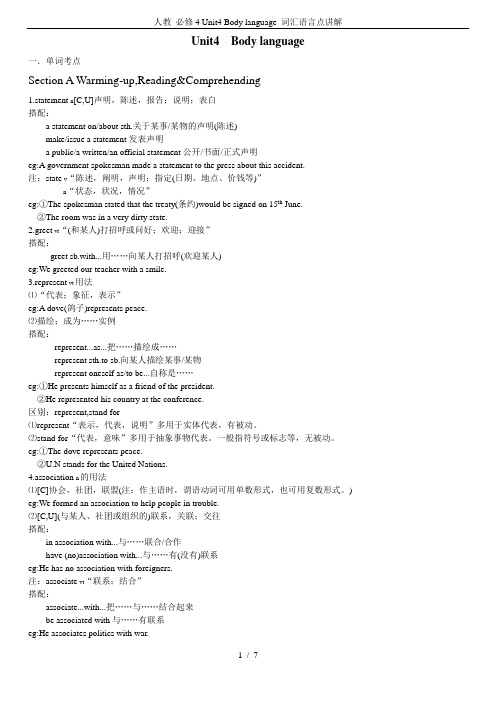
Unit4 Body language一.单词考点Section A Warming-up,Reading&Comprehending1.statement n[C,U]声明,陈述,报告;说明;表白搭配:a statement on/about sth.关于某事/某物的声明(陈述)make/issue a statement发表声明a public/a written/an official statement公开/书面/正式声明eg:A government spokesman made a statement to the press about this accident.注:state v“陈述,阐明,声明;指定(日期、地点、价钱等)”“状态,状况,情况”neg:①The spokesman stated that the treaty(条约)would be signed on 15th June.②The room was in a very dirty state.2.greet vt“(和某人)打招呼或问好;欢迎;迎接”搭配:greet sb.with...用……向某人打招呼(欢迎某人)eg:We greeted our teacher with a smile.3.represent vt用法⑴“代表;象征,表示”eg:A dove(鸽子)represents peace.⑵描绘;成为……实例搭配:represent...as...把……描绘成……represent sth.to sb.向某人描绘某事/某物represent oneself as/to be...自称是……eg:①He presents himself as a friend of the president.②He represented his country at the conference.区别:represent,stand for⑴represent“表示,代表,说明”多用于实体代表,有被动。
_Unit_4_Body_language 词汇

Book 4 Unit 4 Body languageⅠ.重点单词1.n.陈述;声明→vt.陈述;声明→n.发言人2.vt. & vi.迎接;问候→n.招呼;问候3.adj.主要的→n.多数,大多数4.vt.误解,误会→n.误解5.vi.猛冲,突进→adj.振奋的6.n.成人,成年人adj.成人的,成熟的n.成人期7.adj.口语的→adj.未说出口的8.adj.面部的9.n.作用,功能vi.起作用,运转adj.10.adj.错误的,假的11.n.怒气,怒火→adj.愤怒的12.adj.主观的→n.主语,主题13.n.等级,军衔14.vt.代表;象征→n.表现;表示;代理→adj.有代表性的,典型的15.adj.好奇的→n.好奇,好奇心16.vt. & vi.接近,靠近,走近n.接近,方法,途径→adj.可接近的,可亲近的17.vt.保护,保卫→n.防御→n.被告18.adj. adj. adj.可能的19.n.安逸,舒适vt.减轻20 adj. .尊敬的adj. 值得尊重的Ⅱ.重点短语1.greet sb. sth.以……问候某人2.kiss sb. the cheek轻吻某人的面颊3.nod sb.向某人点头4.get know逐渐了解5.language口语6.be to do...很可能……7.general总的来说8.defend 保卫……以免受9.put sb. ease使某人自在;舒适10.lose 丢脸11.be curious 12.apologize sb for sth 因某事而向某人道歉13. the contrary 相反地14,shake hands sb 同某人握手15.trun one`s back sb 背对,背弃核心单词1.greet1)The movie star with cheers from his fans2)I used to send to some of my friens at New Year`s Eve3)She us a smile .2.represent vt.象征;表示;作为……的代表;代表;描绘;描写n.代表;众议员adj.典型的;有代表性的n.表现;陈述;代理①You should represent your complaints to the management.②She represented our class to attend this meeting.③In the western countries,“V” often represents victory.④Our guests today are representatives from six of the major international film festivals.选词填空(represent/representation/representative)1)Each color on the chart a different department.2)The were all amazed by what had happened in the factory.3)Our company has no in Africa.4)The competition attracted over 500 players 15 different countries .5)她自称是英语专家she represents himself as an expert in English .3. approach vt.n.adjHe approached me with stealthy steps. 他悄然走近我。
必修4----Unit--4-Body-language-词汇要点与讲解

• New words and explanation; • 1 statement n. 陈述, 声明
He made his first public statement
about the affair. 他第一次就这一事件发表了公开声明。
She refused to make a statement to the
我们静悄悄地逼近敌人的营地。
• I'd advise taking a different approach.
我建议换个方式。
• 10 defence n. 防御, 防务/ v defend
• He gave his life in defence of his country. 他在保卫祖国的时候付出了生命。
• She was chosen to represent us. 她当选我们的代表。
• 4 association n. 协会, 社团, 联合,
• I benefited much from my association with him.
我从跟他的交往中获益匪浅。
• What association do you have with the color green?
她从椅子上跳起来迎接她父亲。
• 3 represent vt. 表现, 表示, 描绘, 代 表, 象征, 说明, 阐明
• I know who you are and whom you represent.
我知道你是谁并代表谁。
• The red lines on the map represent railways. 这张地图上的红线代表铁路。
杰姆好奇地向房里四下张望。
2023年高考英语一轮复习讲义—— 选择性必修第一册 Unit 4 Body Language
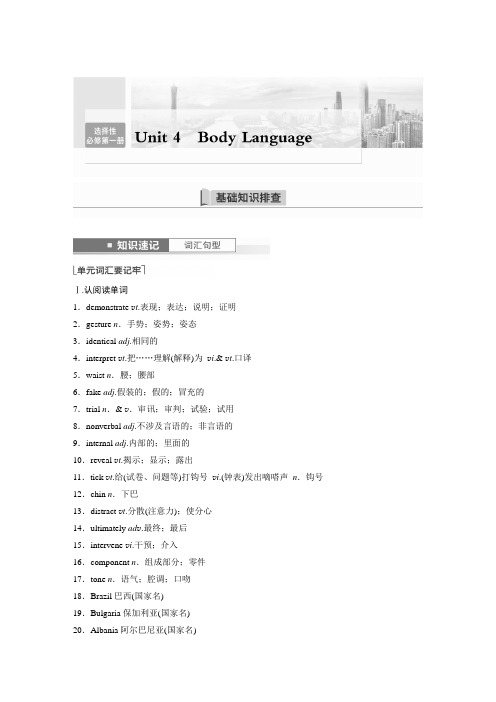
Ⅰ.认阅读单词1.demonstrate v t.表现;表达;说明;证明2.gesture n.手势;姿势;姿态3.identical adj.相同的4.interpret v t.把……理解(解释)为v i.& v t.口译5.waist n.腰;腰部6.fake adj.假装的;假的;冒充的7.trial n.& v.审讯;审判;试验;试用8.nonverbal adj.不涉及言语的;非言语的9.internal adj.内部的;里面的10.reveal v t.揭示;显示;露出11.tick v t.给(试卷、问题等)打钩号v i.(钟表)发出嘀嗒声n.钩号12.chin n.下巴13.distract v t.分散(注意力);使分心14.ultimately ad v.最终;最后15.intervene v i.干预;介入16.component n.组成部分;零件17.tone n.语气;腔调;口吻18.Brazil巴西(国家名)19.Bulgaria保加利亚(国家名)20.Albania阿尔巴尼亚(国家名)Ⅱ.记重点单词1.appropriate adj.合适的;恰当的2.witness v t.当场看到;目击;见证n.目击者;证人3.cheek n.面颊;脸颊4.bow v i.鞠躬;点头v t.低(头)5.barrier n.隔阂;障碍6.incident n.发生的事情;严重事件;冲突7.twin adj.双胞胎之一的;孪生之一的n.孪生之一;双胞胎之一8.slump v i.垂头弯腰地走(或坐等)9.pose n.故作姿态;(为画像、拍照等摆的)姿势v i.摆好姿势v t.造成(威胁、问题等) 10.bend v t.& v i.(bent,bent)(使)弯曲;倾斜;偏向11.clarify v t.使更清晰易懂;阐明;澄清12.lower v t.把……放低;降低;减少adj.下面的;下方的;较小的13.imply v t.意味着;暗示14.stare v i.盯着看;凝视n.凝视15.ceiling n.天花板;上限16.perceive v t.察觉;看待;理解17.chest n.胸部;胸膛18.merely ad v.只是;仅仅;只不过19.bother v i.& v t.费心;麻烦;因……操心n.麻烦;不便20.weep v i.& v t.哭泣;流泪21.conflict n.矛盾;冲突v i.冲突;抵触Ⅲ.知拓展单词1.interaction n.交流;相互影响→interact v i.相互交流;相互影响2.vary v i.(根据情况)变化;改变→various adj.不同的;各种各样的→variety n.多样性;变化;种类3.approve v i.赞成;同意v t.批准;通过→approval n.赞成;同意;批准→approving adj.赞许的;赞成的4.employ v t.使用;应用;雇用→employee n.雇员;受雇者→employer n.雇主;雇用者→employment n.雇用;聘用5.differ v i.相异;不同于→different adj.不同的;有差异的→difference n.差别;差异6.favour v t.较喜欢;选择;有利于n.帮助;恩惠;赞同→favorable adj.赞成的;有利的7.anger n.愤怒;怒气v t.使生气;激怒→angry adj.生气的;愤怒的→angrily ad v.生气地;愤怒地8.reliable adj.可靠的;可信赖的→rely v i.依赖;信赖9.slight adj.轻微的;略微的;细小的→slightly ad v.略微;稍微10.assess v t.评估;评价→assessment n.评价;评定11.educator n.教师;教育工作者;教育家→educate v t.教育→educated adj.受过教育的;有教养的→education n.教育12.tendency n.趋势;倾向→tend v t.& v i.照料;护理v i.倾向于;有……的趋势13.barely ad v.几乎不;勉强才能;刚刚→bare adj.赤裸的;光秃秃的;空的14.occupy v t.占据;占用→occupied adj.使用中;忙于;被占领的→occupation n.占领;职业15.distinguish v i.& v t.区分;辨别→distinguished adj.卓越的;杰出的16.anxiety n.焦虑;担心;害怕→anxious adj.忧虑的;焦虑的;渴望的→anxiously ad v.焦虑地17.embarrassed adj.难堪的;尴尬的→embarrassing adj.使人难堪的;令人尴尬的→embarrass v t.使窘迫;使尴尬18.ashamed adj.羞愧;惭愧→shame n.羞耻;羞愧;让人遗憾的事→shameful adj.可耻的→shameless adj.无耻的;没廉耻的19.inquire/enquire vi.& vt.询问;打听→inquiry/enquiry n.询问;调查20.adjust v t.调整;调节v i.& v t.适应;(使)习惯→adjustable adj.可调整的;可调节的→adjustment n.调整;调节;适应21.react v i.(对……)起反应;回应;(对食物等)有不良反应→reaction n.反应;副作用Ⅳ.背核心短语1.by contrast相比之下2.by comparison(与……)相比较3.make inferences推理;推断4.break down消除;分解;打破5.straighten up直起来;整理;收拾整齐6.in other words换句话说;也就是说7.call on(短暂地)访问;要求(某人讲话等);正式邀请8.at work有某种影响;在工作9.spoken language口语10.shake hands握手1.guidance n.引导;指导2.guilty adj.有罪的;犯法的;感到惭愧的3.gymnastics n.体操4.handle n.柄;把手v t.处理5.handy adj.手边的;附近的;方便的6.harbour (美harbor) n.港口7.harmony n.和谐8.headline n.(报刊的)大字标题1.For example,making eye contact—looking into someone’s eyes—in some countries is a way to display interest.(a way to do...)例如,在一些国家,眼神交流(即直视某人的眼睛)是表示兴趣的一种方式。
人教版新教材选择性必修一单词表知识点讲解Unit 4 Body Language
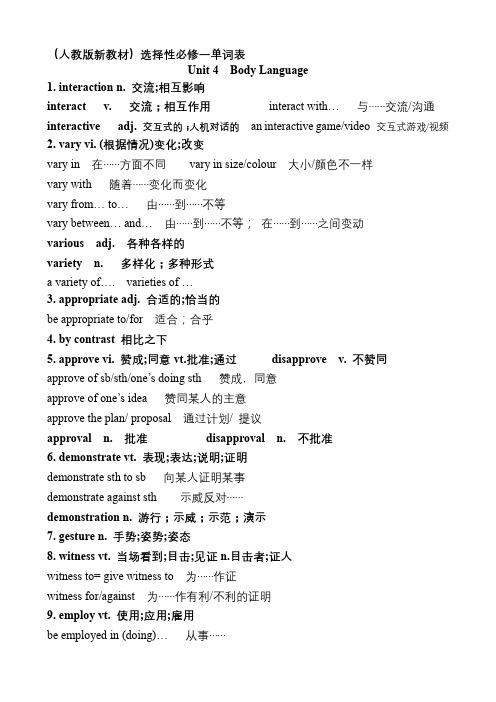
(人教版新教材)选择性必修一单词表Unit 4 Body Language1. interaction n. 交流;相互影响interact v. 交流;相互作用interact with… 与……交流/沟通interactive adj. 交互式的;人机对话的an interactive game/video 交互式游戏/视频2. vary vi. (根据情况)变化;改变vary in 在……方面不同vary in size/colour 大小/颜色不一样vary with 随着……变化而变化vary from… to… 由……到……不等vary between… and… 由……到……不等;在……到……之间变动various adj. 各种各样的variety n. 多样化;多种形式a variety of…. varieties of …3. appropriate adj. 合适的;恰当的be appropriate to/for 适合;合乎4. by contrast 相比之下5. approve vi. 赞成;同意vt.批准;通过disapprove v. 不赞同approve of sb/sth/one’s doing sth 赞成,同意approve of one’s idea 赞同某人的主意approve the plan/ proposal 通过计划/ 提议approval n. 批准disapproval n. 不批准6. demonstrate vt. 表现;表达;说明;证明demonstrate sth to sb 向某人证明某事demonstrate against sth 示威反对……demonstration n. 游行;示威;示范;演示7. gesture n. 手势;姿势;姿态8. witness vt. 当场看到;目击;见证n.目击者;证人witness to= give witness to 为……作证witness for/against 为……作有利/不利的证明9. employ vt. 使用;应用;雇用be employed in (doing)… 从事……be employed to do sth 被雇佣来做某事employ sb to do sth 雇佣某人做某事employ sb as … 雇佣某人为……employ oneself in 使忙于,使从事于employer n. 雇主employee n. 雇员employment n. 雇用unemployed adj. 失业的10. identical adj. 相同的be identical to/with… 与……相同/相似11. interpret vt. 把…理解(解释)为vi.&vt.口译interpret sth in … 用(语言或表演)解释某事interpret as 解释为……;把……理解为……interpret for sb 为某人做翻译interpretation n. 解释;翻译interpreter n. 口译者translate v. 翻译translator n. 笔译者12. differ vi. 相异;不同于differ from= be different from 与……不同differ in (size;age;colour)= be different in 在……方面不同different adj. 不同的 A be different from B in sthdifference n. 区别make a /no difference (to …) 对……有/没有影响或作用tell the difference between A and B 指出A和B的不同13. by comparison (与…)相比较in comparison with/to sth 与某物相比较compare v. 比较;对比;比喻n.比较compare…with… 把…和…比较compare…to… 把…比作…compared with/to (作状语) 与…相比Compared with/to other people, he is fortunate.beyond/without compare无与伦比;举世无双14. cheek n. 面频;脸频15. favour vt. 较喜欢;选择;有利于n.帮助;恩惠;赞同do sb a favour 帮助某人ask a favour (of sb) 找某人帮忙in favour of 支持;赞同in one’s favour 有利于某人Fortune favours the brave. 天佑勇者favourable adj. 给人好印象的;赞同的favourably adv. 顺利地;有利地;赞成地favourite adj. 最喜爱的16. bow vi. 鞠躬;点头v.低(头) n.弓;蝴蝶结17. waist n. 腰;腰部 a slim waist 纤纤细腰18. make inferences 推理;推断by inference 由此推断make a difference 有作用;有影响19. break down 消除;分解;打破20. barrier n. 隔阅;障碍a natural barrier to … ……的天然屏障21. fake adj 假装的;假的;冒充的 a fake $20 bill 一张20美元假钞22. anger n. 愤怒;怒气vt.使生气;激怒23. reliable adj. 可靠的;可信赖的dependable adj. 可靠的;可信赖的rely v. 信任;信赖rely on 依靠;依赖reliability n. 可靠24. incident n. 发生的事情;严重事件;冲突25. trial n.&v.审讯;审判;试验;试用on trial 受审判;在试验中trial and error 反复试验;不断摸索26. slight adj. 轻微的;略微的;细小的27. slightly adv. 略微;稍微28. twin adj. 双胞胎之一的;孪生之一的n.生之一;双胞胎之一29. nonverbal adj. 不涉及言语的;非言语的30. assessment n. 评价;评定make assessments 作出评价31. assess vt. 评估;评价be assessed as… 被判定为……assess the impact of… 评价……的影响32. internal adj. 内部的;里面的33. straighten up 直起来;整理;收拾整齐straighten out 解决(问题);整顿(混乱情况)34. slump v. 垂头弯腰地走(或坐等)35. pose n. 故作姿态;(为画像、拍照等摆的)姿势strike a pose 摆出姿势vi.摆好姿势vt.造成(威胁、问题等)pose a question 提出问题pose for.. 为……摆好姿势pose for a photographpose… to/for…对……产生……pose as… 冒充成……pose a threat/challenge/danger/risk to… 对……构成威胁/挑战/危险/风险strike a pose 摆出某种姿势36. bend vt.&v.(bent, bent)(使)弯曲;倾斜;偏向bend over/down 弯腰;附身bend one’s mind/efforts to… 把心思集中到……上bend to one’s will 顺从某人的意志sharp bend 急转弯37. reveal vt. 揭示;显示;露出reveal sth to sb 向某人泄露某事it is revealed that… 据透露……38. clarify vt. 使更清晰易懂;阐明;澄清clarify a situation/ problem/ issue/stand 阐明情况/问题/论点/立场clarify air 净化空气clarified adj. 纯净的clarified water 纯净水clarification n. 阐明;澄清;净化;(通过加热等的)提炼,净化; seek clarification of 寻求澄清39. in other words 换句话说;也就是说40. educator n. 教师;教育工作者;教育家41. tick vt. 给(试卷、问题等)打钩号vi.(钟表)发出嘀嗒声n.钩号42. tendency n. 趋势;倾向a tendency to do sth 做某事的倾向tend v. 易于; 往往;倾向于; 照料, 看管tend to do sth 往往会......; 倾向于做某事tend to the sick 照料病人trend n. 趋势;动向on trend 流行的43. lower vt. 把…放低;降低;减少adj下面的;下方的;较小的44. imply vt. 意味着;暗示at the name implies 顾名思义implication n. 暗示;影响;后果by implication 言下之意45. barely adv. 几乎不;勉强才能;刚刚barely…when… 表示“一……就……”46. chin n. 下巴with one’d chin on one’s hand 用手托着下巴47. occupy vt. 占据;占用occupy oneself with sth/in doing sth 忙于某事;专心于做某事occupied adj. 没空的;忙碌的keep sb occupied 使某人忙碌be occupied in/with (doing sth) 忙于做某事occupier n. 占用者;居住者occupation n. 占用;职业48. stare vi. 盯着看;凝视n.凝视stare at盯;凝视stare up at 抬头凝视stare sb in the face 凝视某人的脸stare sb down 盯着某人不敢再对视49. ceiling n. 天花板;上限50. distract vt. 分散(注意力);使分心distract one’s attention 分散某人的注意力distract sb/sth from sth 转移(注意力);分散(思想);使分心be distracted from sth 转移对某物的注意力distracting adj. 令人分心的;使人思想不集中的distraction n. 分散注意力的事51. perceive vt. 察觉;看待;理解perceive sth/sb as… 把某人/某事看作……perception n. 知觉;洞察力52. distinguish vi.&vt.区分;辨别distinguish between A and B =distinguish A from B 辨别区分A和B distinguish oneself 显扬自己;使自己出名distinguished adj. 杰出的;著名的be distinguished for/as 因/作为……而出名53. anxiety n. 焦虑;担心;害怕in anxiety 担忧着;挂念着anxiety about/over…担心……anxious adj. 焦虑的; 担心的be anxious about sth for sb 为某人担忧某事be anxious to do sth 做某事很焦虑54. chest n. 胸部;胸55. embarrassed adj. 难堪的;尬的feel/be embarrassed about/at… 对……感到尴尬feel/be embarrassed to do sth 对做某事感到尴尬embarrass v. 使尴尬embarrassing adj. 令人尴尬的embarrassment n.尴尬to one’s embarrassment 令某人尴尬的是56. ashamed adj. 羞愧;惭愧be ashamed of (doing) sth 以某事感到羞愧be ashamed to do sth 以做某事为耻be ashamed of oneself for 为…而害羞feel ashamed for sb 替某人感到羞愧not merely=rather than merely 不仅仅58. call on (短暂地)访问;要求(某人讲话等);正式邀请call back 回电话call in 召集;请来call by 顺路拜访call on sb. 拜访某人call at sp. 参观某地call for 要求;需要;提倡;号召call off 取消;撤销call up 征召入伍;打电话;呼唤出59. bother vi.&vt.费心;麻烦;因…操心;麻烦;不便bother sb with/ about sth 给...造成麻烦,痛苦使...烦恼,担忧bother to do bother doing 花费时间精力做某事bother sb 打扰插话bother n. 麻烦困难(不可数)---Thanks for your help. --- it was no bother.put sb. to botherget sb. /oneself into bother给某人添麻烦60. weep vi.&vt.哭泣;流泪61. at work 有某种影响;在工作at play on duty on business 介词短语表正在进行或持续的动作62. conflict n. 矛盾;冲突vi.冲突;抵触come into conflict with 与……冲突;与……战斗conflict with 与……相冲突conflict over ……的冲突in conflict with sb 与某人的冲突conflict of interest(s) 利益冲突63. inquire vi.&vt. (or:enquire) 询问;打听形近的词:acquire v. 获得;取得;学到require v. 要求;需求inquiry /enquiry n. 询问;打听64. ultimately adv 最终;最后65. adjust vt. 调整;调节vi,&.适应;(使)习惯adjust …to… 使……适应……adjust to sth/doing sth 适应;适合adjust oneself to = adapt oneself to 使自己适应(to是介词)adjustment n. 调整;调节make an adjustment to… 对……作出调整66. intervene vi. 干预;介入67. react vi. (对…)起反应;回应;(对食物等)有不良反应react to 对……作出反应react on/upon 对……有影响react with 与……起反应(多指化学反应)react against 反对;对抗reaction n. 反应;反作用;对抗reactive adj. 反应的;回应的interact v. 相互作用68. component n. 组成部分;零件69. tone n. 语气;腔调;口吻70. Brazil 巴西(国家名)71. Bulgaria 保加利亚(国家名)72. Albania 阿尔巴尼亚(国家名)。
- 1、下载文档前请自行甄别文档内容的完整性,平台不提供额外的编辑、内容补充、找答案等附加服务。
- 2、"仅部分预览"的文档,不可在线预览部分如存在完整性等问题,可反馈申请退款(可完整预览的文档不适用该条件!)。
- 3、如文档侵犯您的权益,请联系客服反馈,我们会尽快为您处理(人工客服工作时间:9:00-18:30)。
Unit 4 Body Language
Period 1 Communication: No problem?
Teaching Procedures:
Step I Greetings (1ms)
Greet the whole class as usual and present the teaching aims.
Step II Lead-in (4ms)
Use a short film to lead students in class. Ask students 2-3 questions after seeing the film.
What did you see in the film? What is he doing? How is he directing traffic?
So we call this gesture body language.
Step III Pre-reading ( 7ms)
In this part, we will do a guessing and discussing game. Give students 3 minutes to enjoy, guess and discuss what information they can get from the pictures. 3 minutes later, ask volunteer students to challenge this guess. After that, give students the question to discuss : Can people communicate with each other without speaking and writing? How?
Step IV Learning new words ( 4 ms)
Give students 2 minutes to guess and match the meaning. Then spend another 2 minutes explain how to remember the new words.
Step V Fast reading ( 5 ms)
Make students read the passage quickly and find the information. 3 minutes later, check the information one by one. Meanwhile, tell students the skills of fast reading.
Step VI Careful reading ( 9mins)
The students greet each other, do they use the same body language? In this part, give students 6 minutes to read the text carefully and fill in the blanks. After that, spend 4 minutes checking the answers one by one.
Step VII Careful reading again (5mins)
Give students 3 minutes to read and find detailed information about the ways to greet each other in different countries. Spend 2 minutes check the answers one by one.
Step VIII Summary and homework (5mins)
Give students 2 minutes to discuss What they have got from this class and then invite 2-3 students to show their results. Assign students homework.。
